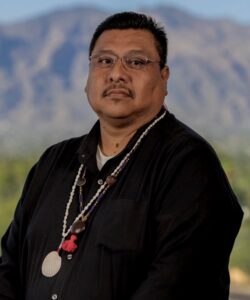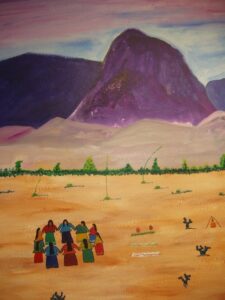This profile is part of the Voices of All of Us series.
Tribal Traditions Inspire Miguel Flores Jr. to Cultivate Collaboration and Continuity
 “If done right, if we are open and honest, there are a lot of benefits All of Us can bring to Tribal communities,” Flores said. “This takes time. We need to build long-standing relationships.”
“If done right, if we are open and honest, there are a lot of benefits All of Us can bring to Tribal communities,” Flores said. “This takes time. We need to build long-standing relationships.”
Miguel Flores Jr. is a substance abuse counselor, traditional healer, and community leader in Tucson, Arizona. Raised in his family’s Indigenous Mexican traditions, he also is a proud member of the Pascua Yaqui Tribe and the Tohono O’odham Nation. Flores speaks English, Spanish, and Native languages, including Yaqui and O’odham.
The blend of languages and cultural traditions inspired Flores’ passion for counseling with a strong focus on holistic practices, caring for the mind, body, and spirit. In his 30-year behavioral health career, he has worked with federal and state governments, academic institutions, and Tribal Nations. Throughout his career, Flores has helped build partnerships and awareness of different philosophies, and expectations.
Flores became involved with the All of Us Research Program in 2018 through his work with the University of Arizona at Tucson, sharing input with one of the program’s first health care provider organizations on engaging with Indigenous communities.
“I was asked to have a seat at the table, to offer my feedback,” Flores said. “That’s not something that happens very often.”
Flores is now a member of the All of Us Steering Committee, where he continues to help guide the program’s progress.
Long-Standing Relationships: Generations of Caring
 Building lifelong relationships comes naturally to Flores, who is a fourth-generation Tribal member. His maternal great-grandmother, Loretta Lucero Alvarez, fled Mexico on foot with a group of refugees when the Mexican government began deporting Indigenous members of the Yoeme village. In Arizona, she served as a Pascua Yaqui Tribal midwife from the 1920s to the 1970s, known for her use of herbs and prenatal massage to successfully deliver breech babies. Tucson’s Kino Community Hospital named their labor and delivery room after her when she passed away in 1992 at the age of 104.
Building lifelong relationships comes naturally to Flores, who is a fourth-generation Tribal member. His maternal great-grandmother, Loretta Lucero Alvarez, fled Mexico on foot with a group of refugees when the Mexican government began deporting Indigenous members of the Yoeme village. In Arizona, she served as a Pascua Yaqui Tribal midwife from the 1920s to the 1970s, known for her use of herbs and prenatal massage to successfully deliver breech babies. Tucson’s Kino Community Hospital named their labor and delivery room after her when she passed away in 1992 at the age of 104.
Alvarez’s legacy lives on in Flores, who was inspired by his great-grandmother’s resilience and commitment to her Tribal community. Flores was raised in the Latino Mexican tradition but was fascinated by Indigenous cultures and customs from a young age. “As a child, my heart always felt comfortable being at the Yaqui ceremonies,” Flores said.
Flores was the first in his family to graduate high school and attend college. While there, he began the start of a new career that fostered his passion for counseling. The program trained him to integrate art and cultural traditions, as well as violence prevention practices. He went on to pursue mentoring positions with the Tohono O’odham Nation, where he qualified for a state license as an independent substance abuse counselor, as well as a certified sex offender treatment specialist. He then opened his own counseling business.
A Healer and Leader
As a longtime traditional healer and spiritual leader, Flores has focused on educating his communities about the need for medical research that includes them. In his role with All of Us, he has informed program leaders about engaging with Tribal communities in ways that respect their cultures and customs.
“There has been generational trauma from research that has had a negative impact on our communities,” Flores said. “Many broken promises, broken treaties.”
Flores believes that the program’s ongoing Tribal consultations are beneficial and making progress. The consultations have given both the federal government and Tribal leaders an opportunity to better understand their different perspectives. The most recent Tribal consultation report, published January 26, 2024, outlines how the program will respond to Tribal leaders’ feedback.
“Building trust, understanding, and partnership takes time,” Flores said. “Sometimes we have two different philosophies of how things get understood—two different time frames.”
Often, his role is in developing a bond between the two groups, helping to build a shared understanding and a path forward. A clear example of this divide is with DNA samples collected by the program. All participants who choose to share a blood or saliva sample can also choose to receive their own genetic health-related results. These results show whether the participant has an increased risk of certain hereditary diseases based on their DNA and how their body processes certain medications.
“Participants do get valuable information back,” Flores said. “I understand that research needs to be done. But a lot of researchers just see DNA as a sample. As Indigenous people, we see it as a gift. We’re giving you part of our life.”
Throughout Flores’ career, the commitment to teaching Native customs has remained constant.
“I have always been proud of who I am and where I am from,” Flores said. “The culture has never changed. While technology and times may change, the songs, the music, the medicines, the teachings have always been passed down through the generations. It’s my job to help people understand the significance, the meaning.”
To learn more about All of Us’ activities with Indigenous and Tribal communities, visit https://allofus.nih.gov/about/diversity-and-inclusion/tribal-engagement.